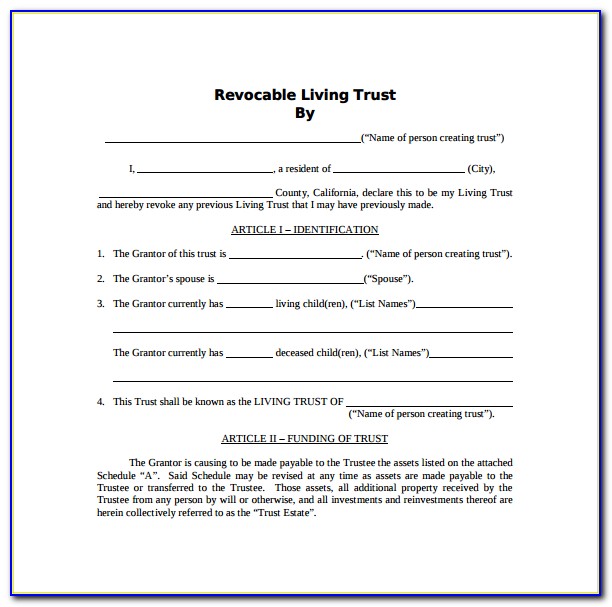For the benefit of your dear ones, a living trust should be an important part of your estate plan, to avoid probate when you pass on. Although many do not really understand the concept of a revocable trust and how it works. Therefore this article will expand your horizon on what a revocable living trust is, its cost, form, and how it is operated in California.
Overview
Before we begin lets glance through what the word “Trust” entails.
According to Wikipedia, “Trust is a legal relationship in which the legal title to property is entrusted to a person or legal entity with a fiduciary duty to hold and use it for another’s benefitTrust is a contract between its maker and a trustee”. This enables, the trust maker or grantor gives instructions to the trustee concerning the trust assets. This set of instructions specify how the assets will be held and distributed during the grantor’s good health, or upon his disability, as well as in case of demise.
However, the term “revocable” refers to a set of powers that are enlisted in the trust agreement that specifies that only the grantor has the power to amend the trust. On revocation, it is mandatory for the trustee to return all trust assets to the grantor.
Now let’s merge the breakdowns to the phrase “Revocable Trust’.
What is a Revocable LivingTrust?
A revocable living trust is an advanced estate planning tool that designates who receives your property when you pass away. They are mostly used by individuals whose gross estates are taxable for federal estate tax purposes. It allows the grantor to maintain ownership over their assets and make alterations to the trust documents at any point in their lifetime. A revocable trust is also a way to reduce tax burdens as well as your assets going through probate.
A revocable trust helps you to totally avoid living and death probate proceedings. You can also incorporate instructions into a revocable trust specifying how your trustee should manage your assets if you become disabled. In a revocable living trust, a person can sometimes be both the maker and the trustee.
In addition, do ensure that your new properties or assets are in the trust as you purchase them. Any property outside of the trust at the time of your death may still be subjected to probate because you fail to include them in the trust.
Key Notes
- Revocable trust adheres to the wish of the grantor.
- It ensures privacy.
- It reduces state estate taxes
Besides, If you fall ill or incapacitated to manage your assets, this trust agreement should include a trustee who takes over on your behalf. The trustee takes over all bills and any responsibility associated with managing the assets. He/she has the power only to manage the assets but not to revoke the trust.
Lastly, after your demise, the trust becomes an irrevocable trust. Your successor trustee takes over the distribution assets according to your wishes, becomes in charge of paying bills. They are also responsible for distributing the remaining assets to heirs as mentioned in the trust.
Revocable Living Trust Form
A revocable trust form is used to outline details of a trust. Your revocable trust form should include all specific details of your assets as earlier mentioned above. However, below are a list of assets expected in a revocable living trust form.

- Cash/bank accounts
- Certificates of Deposit (CDs)
- Business interests
- Personal property( This includes furnishings, automobiles, jewelry), etc.
- Real estate
- Brokerage accounts and stocks (such as any stock holdings or retirement accounts).
California Revocable Living Trust
Unlike any other state or country, the California revocable living trust is a document that is the same as others. Although, its processes vary. Its only difference is that if a married couple divorces, the community property laws in California may affect how the trust operates.
Initially, California is a community property state, which means that each spouse has a right to half of all marital property. Therefore in the event, they get a divorce, any property of a spouse either before marriage or, as gift or inheritance, is separate property. Thus, it remains with the original owner upon divorce.
Similarly, California trusts also contain specific provisions outlining what happens to the trust’s assets in the event of a divorce. Then, in that case, California’s community property laws can change how a revocable living trust operates. Anyways, It is generally prohibited under state law for either spouse to change or revoke a trust once the divorce proceedings start. To some extent, it may be done to determine how to divide the trust’s assets.
Furthermore, If the trust was funded by the marital property, a court considers the trust marital property and divides its assets equally between the spouses. Moreover, to avoid this outcome, the trust agreement should explicitly outline what happens in the event of a divorce. That is the greatest essence of a revocable trust.
Revocable Living Trust Cost
The cost of any Probate varies from state to state. This means fees for living trusts in Nigeria might be different from New York. While creating your estate plan, often consider if you are on a trust-based estate plan or a will-based estate plan. This determines the cost of how much money you should spend on an estate plan.
Another consideration is in the cost of transferring any real property deeds into the trust and moving your other assets into the revocable living trust.
Moreover, If you choose to hire an attorney in building your trust, trust me that you’ll likely pay about $13,000, and fees for couples are at a higher rate. Involving a legal professional can be a bit expensive option for some people. It is also wise to consider the DIY approach in creating living trusts.
The DIY method is significantly less expensive than hiring an attorney. However, this approach can be a bit riskier since you aren’t hiring a professional. If you choose this option, you can typically use online software to build your trust, and it’ll cost you a few hundred dollars.
Related Articles:
- LIVING TRUST VS WILL: Best option in the US (+Major differences).
- LIVING TRUST: Overview, Cost, Templates, Pros & Cons (+Writing Guide)
- Grantors Trust: A Simple definitive guide (Updated!)(Opens in a new browser tab)
- Declaration of Trust: Best US Practices & Definitive Guide
- SUCCESSOR TRUSTEE
Conclusion
Finally, A revocable living trust can be a valuable estate planning tool to help you maintain and control your assets during your lifetime or after demise. The trust allows flexibility for life changes in terms of marriage, divorce, and increase in children(if any).
Disclaimer!
When handling great estate plans such as revocable living trust, It’s important to speak with a legal professional for assistance. This will completely guide you to understand the pros and cons of your intentions. To this end, this article is intended to convey general information and not legal advice.






